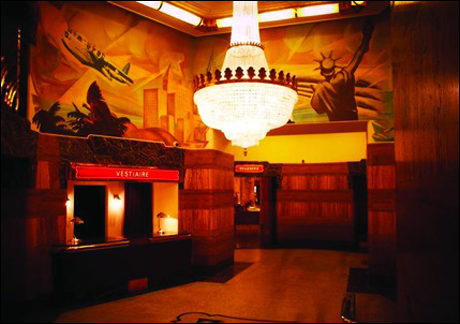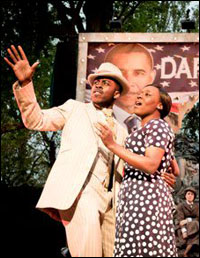
*
If you want a really good post-theatre dinner in London — a proper dinner in a fine restaurant with napery and first-rate food — the choices are remarkably limited, as most restaurants, even the good ones, close their kitchens at 11 PM. And if you want to add stargazing to your evening's entertainment, the pickings become slimmer still.
So the opening of a new restaurant right on Piccadilly Circus, in the center of West End theatreland, is a genuine event, especially when its progenitors are Jeremy King and Chris Corbin. Probably the most successful restaurateurs in London, all the best "theatre" restaurants were started by these two. Whenever I meet Broadway stars and impresarios in London, it's at one of the eateries — no, they're not eateries, they're fine food emporiums — either owned or formerly owned by Jeremy and Chris. For those of us who customarily eat after the theatre, the Wolseley or the Ivy are home. (Eating before curtain time always seems like teatime to me). Sheekey's and Scott's are their fish havens, and Le Caprice, which used to be theirs, is the hideaway for the stars who don't want to make a big deal out of their presence in London. I always want to eat in any enterprise connected with King and Corbin. I know that the food will be great, the company will be distinguished, and the service will be impeccable, usually staffed by familiar faces who have come up through the ranks of King and Corbin's various restaurants.
Now they've opened, in splendidly restored Art Deco surroundings, a true French brasserie. Open all day, from café au lait and a croissant in the early morning to a late-night snack, Brasserie Zédel boasts not only a 240-seat restaurant but also a beautiful bar and a cute little cabaret space. I was invited to the "soft opening" (which is what happens when a restaurant invites friends and colleagues to try it out so they can sort out any teething problems), and I can report a great evening.
While we're on the subject of exciting openings, a theatre I thought had gone for good is coming back in a new incarnation and promises not only a new arts center but also a restaurant and bar that will be open all day. Where the now defunct Westminister Theatre used to be, near Buckingham Palace, the first newly built theatre complex in Central London in 30 years is rising from the ground. It will be called the St. James Theatre. Easy to get to by public transportation, Victoria already has two of London's biggest theatres — the Apollo and the Victoria Palace — and could use what is being offered here: a smaller, 312-seat theatre with a 150-seat studio space. The programming for the new theatre, just announced, is ambitious. First up is a brand new play by a well-known comedienne and broadcaster, Sandi Toksvig, about the moral effects of military occupation on soldiers. Then there's an award-winning American production of the musical Daddy Long Legs, currently touring the U.S. and directed by John Caird, who co-directed Les Misérables. This will be followed by Cinderella for Christmas and then a revival by the original director, Max Stafford-Clark, of Timberlake Wertenbaker's brilliant signature play, Our Country's Good. It chronicles the convicts in an 18th-century Australian prison camp putting on the first play ever to be staged in Australia.
The St. James Theatre is a thrilling new venture and we should all wish it Godspeed. I promise to watch its progress on your behalf with interest and enthusiasm.
 |
| The Grand Lobby of Brasserie Zédel |
 |
||
| Danny DeVito and Richard Griffiths |
||
| Photo by Johan Persson |
Ragtime is, in my opinion, the greatest musical of the last quarter of the 20th century not written by Stephen Sondheim. It was, in fact, written by Lynn Ahrens and Stephen Flaherty, with a book adapted by Terrence McNally from the novel by E.L. Doctorow. There are thousands of bad adaptations of good books, and hundreds of good adaptations of bad books, but this is that rare animal (I can only think of one other) where the show is actually as good as the original material and the original material is just splendid. (The other is My Fair Lady.) In all truth, this production in Regent's Park by Tim Sheader is not the best I've seen. In a misguided and thoroughly unnecessary attempt to make the show "relevant," he has it begin and end on a modern junk heap with the cast dressed in rags. There's some pretty ragged singing, too, and Javier de Frutas's choreography, while exemplary in other shows, misses on several levels. But it's still Ragtime, and once they get the directorial conceit out of the way, the show returns to the beginning of the 20th century and to being about nothing but the teething pains of America.
The score is, song by song, still as moving and fresh as the first time I saw Ragtime (in an enormous theatre on 42nd Street in New York) and the last time I saw it (in the tiny Landor Theatre, in a London suburb). Like all the great musicals, no matter what you do to it, it will always, always be great.
 |
||
| Rolan Bell and Claudia Kariuki in Ragtime. |
||
| photo by Johan Persson |
I mentioned that there's a new cabaret space at Brasserie Zédel. It will be known as The Crazy Coqs. The burgeoning cabaret scene in London has now opened two more spaces to take up the slack where the late, lamented Pizza on the Park used to be. In Wandsworth, way off the beaten theatrical path, is a charming, 180-seat auditorium called Lost Theatre (LOST turns out to be an acronym, not a description, of the London Oratory School Theatre). It is a perfect space for the more theatrical cabarets, such as the one presented by singer-actor Peter Straker. His collection of the songs of Belgian songwriter Jacques Brel are sensitively performed against the background of his life. As all Brel enthusiasts know, the songwriter died of alcohol and cigarettes in 1978 at the age of 49, but Straker does a wonderful job of illustrating why he is still remembered and performed. Also noteworthy on the cabaret front is the opening of an impressive new space, The Matcham Room in the London Hippodrome gambling casino. This is the same building where the old Talk of the Town used to be, in a huge former theatre designed by the great architect Frank Matcham at the turn of the last century. My parents took me there as a child to see Marlene Dietrich because, they said, she was a phenomenon and everybody ought to see her at least once. Janie Dee, a much loved and awarded English singer, actress and double Olivier Award winner, opened the space with her quirky and charming signature set of carefully chosen songs. Accompanied by Alexander Bermanche, she is an elegant and accomplished guide to the cabaret form. From Gershwin to Alan Ayckbourn, via many side trips to other songwriters and other languages, her versatility and pin-accurate voice allow her to tackle a range far broader than most cabaret acts, and her enchanting personality persuades everyone in her audience to fall in love with her. Cabaret, to misquote Jacques Brel, is alive and well in London.
Check out Playbill.com's London listings.
(Ruth Leon is a London and New York City arts writer and critic whose work has been seen in Playbill magazine and other publications.)
*
Check out more of Playbill.com's international coverage, including London correspondent Mark Shenton's daily news reporting.










